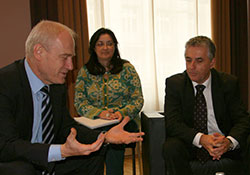Policy dialogue on public health in Slovenia

WHO/Marijan Ivanusa
A policy dialogue was held in Ljubljana, Slovenia on 26 October 2012 to bring together different actors in public health to futher build on synergies, collaboration, mutual respect and transparency in strengthening public health in Slovenia.
Background
In 2012, the Government of Slovenia decided to reorganize its public health institutions as part of a response to strategic alignment. Several institutes shall merge into two: the National Institute for Public Health and the National Laboratory for Health, Environment and Food. The decision was made after many years of discussions on what works best for public health in Slovenia. This is in line with the global and European efforts to strengthen public health and thus enable it to address the challenges of the 21st century.
Dr Tomaž Gantar, Minister of Health, pointed out that organizational changes are imminent in public health and that it requires more resources. The Minister confirmed that public health and prevention are important priorities for the Ministry, and that the structural changes are seen as an opportunity to respond better to the challenges ahead.
Dr Josep Figueras, Director, European Observatory on Health Systems and Policies, provided a broader frame for discussions with his presentation on challenges and facets of public health in Europe, which also included information on recent WHO documents such as the European Action Plan for Strengthening Public Health Capacities and Services and Health 2020. There is evidence that public health measures can be highly cost effective and that public health shall be highly engaged during the financial crisis.
Recommendations for public health strengthening
Based on recent research, Prof. Helmut Brand, Maastricht University, positioned Slovenia among countries including Belgium, Spain, Estonia and Greece. Public health in this group can benefit most if the countries enhance partnerships, invest in human resources and establish effective financial mechanisms.



